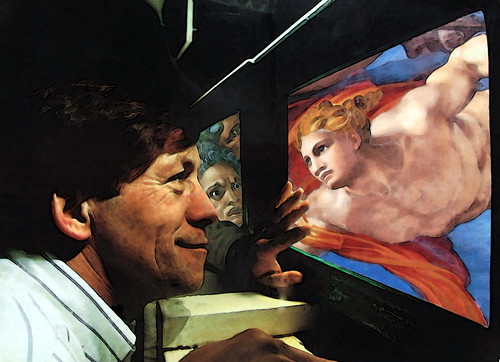
A great question for Labor Day in the US and Independence Day in Brazil.
Andy Revkin at the NY Times has revisted the discussion of "Wealth, Work and Well-Being" at his Dotearth blog as sort of a Labor Day "special". The question of "what is happiness?" is core to the discussion.
I tossed in my 2 cents worth and he picked my comment as an "Editor's Choice". (Thanks Andy.) Here's what I had to say:
It's a lovely sunny Monday morning here in São Paulo where we are also celebrating a holiday, Brazilian Independence Day. And the thought of independence, of freedom from the past, brings me to yet another comment.
What is happiness? I believe it is freedom from the burdens of the past. It is independence from attachments to concepts that hold us back, that prevent us from stepping freely in the promises of future possibilities. If you are anything like me, perhaps you will see that a major bondage is our individual and collective judgments learned in the past or, indeed, our judgments of the past and of who we are.
Yes, there is a world of suffering. Yes, greed too often runs amok. Yes, our world needs to change. But why is it that in seeking a better world we so often end up judging each other for our very human qualities? Why do we think that we must change Human Nature? Do we really believe that to be human is to remain trapped in some sort of an Original Sin?
The Hebrew word for "sin" simply means to "miss the mark", to err or to be somehow "off-target". It's not a condemnation. It's how we learn and evolve. It's called, "trial and error". There's nothing "wrong" with that. It's simply our learning program.
As humans, we seem to have three main tendencies -- we expand the use of our tools, we multiply our numbers, and we generate a lot of waste. Is this wrong? Does it make us a failure? An experiment turned bad? Does the earth need a new Operating System? A whole new species?
I have come to believe that the answer is, "NO". We don't need a new OS, a White Leopard to replace Human Nature. But we desperately need a new configuration. Let me offer two examples of how Human Nature might be re-configured, one ancient and one quite contemporary:
My first example is the Potlatch ceremonies of the tribal peoples of the Pacific Northwest. The Potlatch was a great Giveaway ceremony that has been mistakenly interpreted by some romantic moderns as a great example of altruism, a replacement of competition with mutuality. But it was nothing of the kind. Indeed, it was an aggressive and often insulting competition through which families vied for status and type-A young warriors competed for the attention of the prettiest chicks. A young warrior would never accumulate possessions that would inhibit his prowess as a hunter. The way to advance was to give it all away and attract what he really wanted -- sort of a google principle.
The point is that these people did not try to change human nature. They configured greed, lust, envy, status and power competition into something that was communally beneficial.
My second example also has ancient roots but is now emerging in a contemporary form.
As Andy points out repeatedly, sustainability is the great 21st Century challenge as we head toward 9 billion people. Greater efficiency can offer some relief but it ultimately leads to more taking of the earth's resources. Aggregate consumption increases with development. Waste multiplies with numbers even as family size decreases. We still expand our takings, multiply our consumption and put our waste into the air and water. This is not "bad" Human Nature but rather a bad configuration. It violates Natural LAW (Land, Air, Water) by forgetting that the Land (soil) must be renewed.
Here's where we come back to Brazil and the terra preta practices of ancient Amazonian peoples who are now thought to have once supported high density populations of millions living in balance with the forest. They apparently achieved this feat by putting their waste not into the air or water (as industrial societies have done and still do) but by converting it all into a charcoal based soil amendment that increased soil stability and fertility. They did not stop wasting. They turned waste into an earth renewing resource.
Here's the seminal BBC documentary The Secret of El Dorado and here's the contemporary International Biochar Initiative that is carrying the ancient terra preta configuration into modern forms.
No, there's nothing fundamentally flawed with Human Nature. We just need to re-configure it into becoming more fully human which means, more relational, more reciprocal and, thus, more sustainable.
Finally, to come full circle, the global 2010 IBI meeting will be held in -- you guessed it -- Rio de Janeiro, Brazil.
What is happiness? I think it is whatever lessens our problems and helps us reconnect -- to the earth, to each other, and to ourselves. We are learning now in fits and starts how to be more fully human. With luck, one day we will be able to reach for happiness no longer as consumers but as creators.
As the wise Hopi elder said, "This could be a very good time."
Wonderful comment Lou,
ReplyDeleteYes, even the Potlatch is like all other tools of man. I include the gardens I build for rich people.
The NABI conference was a dream, got to meet all the Biochar luminaries.
There are dozens of soil researchers on the subject now at USDA-ARS.
and many studies at The up coming ASA-CSSA-SSSA joint meeting;
http://a-c-s.confex.com/crops/2009am/webprogram/Session5675.html
And for anyone who doughs the speed this technology is entering public discourse; "The Economist"!!
http://www.economist.com/sciencetechnology/displaystory.cfm?story_id=14302001
Your Chartarian,
Erich